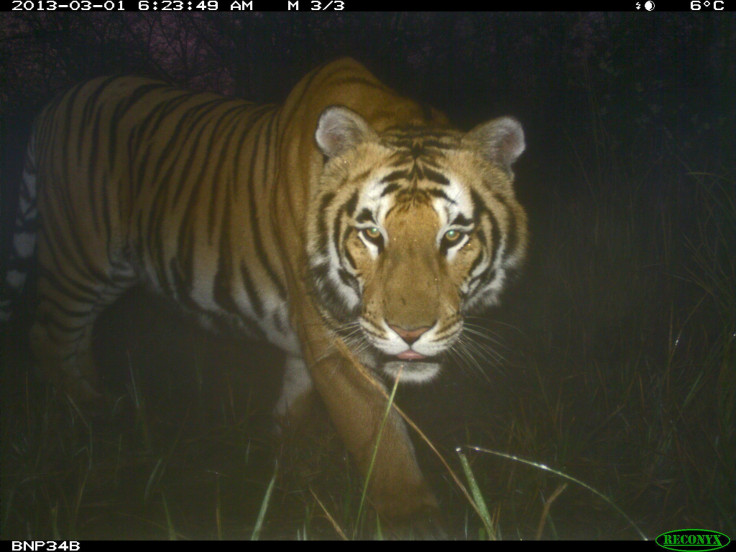Cat’s Meow! Royal Bengal Tiger Population In Nepal Rising, Raising Hopes For Their Survival

In stark defiance of a disturbing global trend, the Nepal government has scored a resounding victory in the protection of an endangered animal species. The number of royal Bengal tigers, the most numerous subspecies of the tiger in the Himalayan kingdom, has jumped by 63 percent over the past five years to just below 200, reaching population levels not seen since the 1970s, according to a new census.
"This is very encouraging," Maheshwar Dhakal, an ecologist with Nepal's National Parks and Wildlife Conservation Department, told Reuters. "But the increased numbers have also added to our responsibilities and challenges for the conservation of tigers.”
Wildlife conservationists say they are optimistic that Nepal's success in saving the big cats may inspire a campaign to reverse a century-long decline in the tigers across South Asia.
"Tigers are a part of Nepal's natural wealth and we are committed to ensuring these magnificent wild cats have the prey, protection and space to thrive," Megh Bahadur Pandey, director-general of the parks and wildlife conservation, said.
Based on some estimates, no more than 3,000 tigers remain in India, Bangladesh and Nepal, representing a 95 percent plunge over the past 100 years. By the year 2022, Nepali authorities have vowed to double the number of tigers from the 121 it recorded in 2009. Dhakal noted that in neighboring India, there are now only about 1,300 royal Bengal tigers living in a number of large protected wildlife reserves, although the final data hasn't yet been tabulated.
Tigers have been vanishing across Asia as the result of a number of man-made factors, including the high price fetched for tiger skins, bones and other body parts, which are used in Chinese medicines (an ironic result of increased prosperity on the continent, although Nepal remains very poor). Tiger parts are also in great demand in Tibet.
"The trade in tiger parts is lucrative and fetches thousands of dollars in illegal markets," Diwakar Chapagain, head of the World Wildlife Fund’s Nepal unit, said.
Britain's Guardian newspaper noted that foreign gangs, mostly based in India, sometimes pay poor Nepalis substantial amounts of money to kill the big felines. These international criminals work hand in hand with some corrupt Nepali officials to facilitate the illegal trade. But tigers have also been threatened to the brink of extinction by deforestation, humans encroaching on their ancient habitats and by diminishing numbers of available prey.
Earlier this year, BBC cited a survey by researchers at Cardiff University in Wales, warning that tigers in India could also become extinct amid falling numbers in the variety of mating partners. The Cardiff study found that 93 percent of DNA variants in tigers shot during the British Empire, don't exist in contemporary cats. Consequently, their gene pools have shrunk.
Nonetheless, conservationists have praised the Nepali government for better policing of national parks, taking a tougher stance against poaching and improved management of habitats for the tigers.
In a statement, Nepal's WWF representative Anil Manandhar said, “While we celebrate the positive results from this tiger survey, WWF calls on the government of Nepal to redouble efforts to protect these conservation gains that could easily be lost as human-tiger conflict increases and illegal wildlife trade empties our forests.”
The rising population of tigers has led to an unfortunate byproduct -- more people are being killed by the animals. Last year, seven people lost their lives to tiger attacks in Nepal’s national parks, up from four in the previous year.
The "government is making conservation plans for tigers," Krishna Bhurtel, a village chief in the Chitwan district, told Nepali newspaper Nagarik. “But it should also come up with plans to protect people from tigers.”
Chitwan national park boasts about 120 tigers, more than half the country’s total. In May, local authorities captured a royal Bengal that had killed two people in Chitwan, including a villager who was yanked out of his bed.
© Copyright IBTimes 2024. All rights reserved.





















